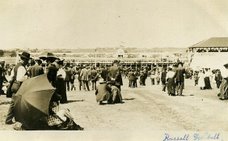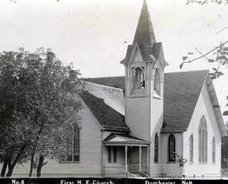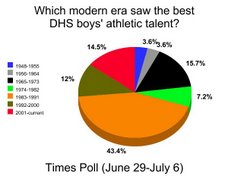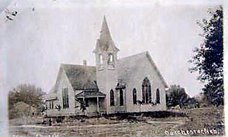In 2007, one reader told us that he lived through the last "paving push" and saw it nearly tear apart the town. He added: "I hope before you drag this issue through the mud that you have done your homework. You seem to be a big pusher of improvement, but not once have I heard how to pay for it. ... It might pay for you to personally do some homework on costs before you push things. ... Learn from history."
With a challenge like that, the Times uncovered news articles from the summer of 1979, when the Lincoln Star covered Dorchester's great paving debate. Today, we are republishing one of those articles below. (The other is available here.)
With a challenge like that, the Times uncovered news articles from the summer of 1979, when the Lincoln Star covered Dorchester's great paving debate. Today, we are republishing one of those articles below. (The other is available here.)
The passage of time has a strange way of shedding light on matters, making it easier for new generations to see things more clearly and allowing them to chose the best way forward. What was decided more than four decades ago may not be right for today or the future. Therefore, it's worth sharing these articles, especially with those too young to remember.
Now, let's revisit 1979 and the discussion that embroiled our community...
Lincoln Journal - July 3, 1979
Paving is Hot Topic in Dorchester
DORCHESTER – What, in a town of 630 on a warm summer’s evening, does it take to get 120 people to a village board meeting? Paving.
That was about the only thing decided here Monday night as folks got together to discuss the only topic in town hotter than the temperature inside the community center.
With the group apparently split about 2-to-1 against paving, emotions soared during the two-hour session. Yet, almost like a family spat, nobody was called anything worse than his first name – which happened repeatedly.
Technically the session was called for the routine creation of three districts involving only four blocks of paving. But most of the argument centered on the “gap paving” that Mayor Bill Moser says they board probably will order in later.
The mayor says even the gap total probably will not exceed four or five blocks, but opponents fear it will eventually checkerboard most of the town. They contend numerous older people as well as young home owners will lose their properties if the paved segments are put in.
“I lived on a farm and walked in both dirt and manure and it didn’t hurt me,” said Belva Johnson, cafe owner and outspoken opponent of the $21-per-front-foot paving. “If it wasn’t for dirt, how many farmers could have come to town and retired?”
That was one of several comments drawing applause. But so did a remark by proponent and retired farmer Hans Weber that “dirt streets don’t bring people into town.” Paving is “good for the town,” he continued. "Name me one little town around here that doesn’t have paving.”
Several others echoed Weber’s sentiments, saying it should be within their rights to have paving if desired. Approximately 30 to 40 persons stood up when asked how many persons present favor surfacing.
Two young wives, Cindy Meyers and Sally Danekas, said their families would not have moved to Dorchester had they known paving – which would be the town’s first since the 1930s – would be contemplated.
This brought a retort from businessman Dick Sehnert who asked, “Where exactly would you have moved? There’s paving in Friend and Wilber and Crete, too...”
Attorney Merritt James of Lincoln, representing the Walton Construction Co., which has the paving contract, said the firm had been “unfairly chastised” by published remarks critical of the firm’s work. Both Mrs. Johnson and Sidy Bruha said they had received requests by letter but refused to change their opinion.
That was about the only thing decided here Monday night as folks got together to discuss the only topic in town hotter than the temperature inside the community center.
With the group apparently split about 2-to-1 against paving, emotions soared during the two-hour session. Yet, almost like a family spat, nobody was called anything worse than his first name – which happened repeatedly.
Technically the session was called for the routine creation of three districts involving only four blocks of paving. But most of the argument centered on the “gap paving” that Mayor Bill Moser says they board probably will order in later.
The mayor says even the gap total probably will not exceed four or five blocks, but opponents fear it will eventually checkerboard most of the town. They contend numerous older people as well as young home owners will lose their properties if the paved segments are put in.
“I lived on a farm and walked in both dirt and manure and it didn’t hurt me,” said Belva Johnson, cafe owner and outspoken opponent of the $21-per-front-foot paving. “If it wasn’t for dirt, how many farmers could have come to town and retired?”
That was one of several comments drawing applause. But so did a remark by proponent and retired farmer Hans Weber that “dirt streets don’t bring people into town.” Paving is “good for the town,” he continued. "Name me one little town around here that doesn’t have paving.”
Several others echoed Weber’s sentiments, saying it should be within their rights to have paving if desired. Approximately 30 to 40 persons stood up when asked how many persons present favor surfacing.
Two young wives, Cindy Meyers and Sally Danekas, said their families would not have moved to Dorchester had they known paving – which would be the town’s first since the 1930s – would be contemplated.
This brought a retort from businessman Dick Sehnert who asked, “Where exactly would you have moved? There’s paving in Friend and Wilber and Crete, too...”
Attorney Merritt James of Lincoln, representing the Walton Construction Co., which has the paving contract, said the firm had been “unfairly chastised” by published remarks critical of the firm’s work. Both Mrs. Johnson and Sidy Bruha said they had received requests by letter but refused to change their opinion.
“The company feels that never in 40 years of doing business has it been so unfairly attacked,” continued James. He insisted that the complaints actually derived from job specifications to which the contractor is complying.
The board unanimously approved two of the three small districts, both created by at least the 60 percent of affected property owners required by law. Because of a legal description error, the third district will have to be re-advertised.




















































Wow, this takes me back
ReplyDeleteRecently the town that I live in completed a five district pavement improvement. The payment structure for the abutting land owners looked something like this:
ReplyDelete6" thick, 30' wide concrete street with curb and gutter=
$63-$70 per linear foot
(Note this was just for paving, not including major improvements such as storm sewer, etc)
If land owner with lot of 66x132 with 66' being frontage:
66'x$63=$4158
66'x$70=$4620
In this case 10% of that total was due the first year leaving the balance to be paid yearly within 14 years at 6% interest. Both the max years and interest percentage were determined by our council and bonding institution.
If $4620 than 10%=$462 due first year. Balance of $4158 amortized over the 14 years at 6% = $447.34 per year=
$37.28 per month
I hope that the math in this works, if not Schulz would be mad.
Again, I write to only give a perspective, I don't feel that I should give an opinion since as a non-resident I would not be paying for the improvements.
Mike, I am glad that you are giving somewhat of a round about number for people to look at, because some people who live in town have no idea how much paving could possibly cost. Thanks Mike
ReplyDelete$37/mo. is half of what we pay for cable TV.....but maybe Skinamax on Friday nights is more important than improving and investing in the town??? By the way my husband has relatives in Pleasant Dale and Milford. Theres no storm water drains in those paved towns.
ReplyDeleteOne town I know of paid for their paving projects through bonds covering 75% of the financing. Assessments to homeowners paid for the other 25%. There would be no need to send grandma to the poor house if the committment was there. Tax Increment Financing, or TIF, is another method many towns in Nebraska use to enhance infrastructure, but that could better used to help Dorchester's business district.
ReplyDeleteHere's a friendly suggestion for the town board or DACA members: Tax Increment Financing is the use of newly-created property tax dollars on new real estate improvements to assist in paying for the water, sewer, and streets to serve those improvements. It is the use of new tax dollars that would not exist without the project. The taxes that were in place on the real estate prior to the new project are still collected by all taxing entities. In Nebraska, TIF can only be used in an area that has been determined to be both substandard and blighted. (Think the Conners' Building.) The newly created property tax dollars can then be used for demolition of a substandard or blighted structure, street and utility improvements for the specific property and other project related costs. A cost benefit analysis is required. Cities do this to improve rundown properties, encourage new construction, improve neighborhoods, increase their property tax base and bring new jobs to the community.
ReplyDeleteWhere will the "newly created property tax" come from? No matter if you use TIF to finance a single project or by using a TIF district (think of a TIF "bucket" where applicants within the district can pull money from) rather large scale real estate improvements and development will need to take place. Is anyone in Dorchester willing to make such improvements, in order to create the "increment". I agree TIF is certainly a great economic development tool, but is not suitable everywhere.
ReplyDeleteBusinesses and interested persons would likely have to be lined up prior to TIF being implemented by the city board.
ReplyDeleteIf Dorchester had potential business owners interested in renovating downtown buildings, or business owners looking to expand existing businesses, the property taxes on the buildings could be frozen at their current level for several years. By doing this, there would an incentive to bring more business downtown. If there's more business, there would be "newly created property tax" in future years.
EXAMPLE: If the Westside Saloon wanted to expand its operation northward, under TIF, the pub owners would pay the same level of property tax over the next 15-20 years, even if the business owners spend $500,000 in improvements. Eventually, a $100,000 building could be worth $600,000, adding a lot to the city's and school's property tax base, while giving the business some recovery time.
Read more about TIF by clicking here
I would like to comment further on the use of Tax Increment Financing (TIF). While very beneficial in certain cases, it is not the #1 or only answer.
ReplyDeleteGenerally speaking the increment that is created from the improvement in real estate is based upon the difference in the pre-development value levied tax and the post-development value estimated levied tax. This increment is than figured across the life of the "redevelopment plan" which in Nebraska is 15 years max(or shorter,until the cost of the redevelopment is paid for). This increment is pledged towards a bond.The bond proceeds go toward costs associated with carrying out the redevelopment project, which according to NE's Community Development Law are to be spent on "public" infrastructure improvements, that are necessary for the redevelopment project to take place.
When the property owner pays the yearly taxes, the owner pays the fully levied tax. The county treasurer takes the previous "frozen" amount and pays the political subdivisions. The treasurer than uses the remaining tax amount to issue to whomever is the bond holder.
TIF is a confusing and drawn out project. All of this takes place after the creation of redevelopment area, (blight substandard study)public hearings, creation of Community Development Authority (or CRA), redevelopment contract and plan, more public hearings and finally the redevelopment project can begin.
Plenty of pre-planning by the board will need to take place prior to anyone wanting to take advantage of TIF.
i would love to respond to mike's comments.
ReplyDeletewhy dont you live in dorchester??
you are sure interested in what's going on here but you live somewhere else?
Take care of your own town and leave ours alone
bye
Here's a thought...........maybe improvements aroudn town would bring in some younger blood and let us keep the kids we pay to educate. Thats just my 2 cents as someone who lives in town.
ReplyDeleteResponding to the crusty comments two spots above ---- how idiotic! That's exactly the backwards, ignorant, wrongheaded type of attitude we don't need. We'll take suggestions from anyone who is knowledgable. Besides he even stated he didn't have an opion either way. Its not like he was sneaking into our ballot boxes. I thought Mike added a lot to the conversation. The person who wrote those comments needs to understand one thing ---- its not just YOUR town!!!!!!!!!!! Who do you think you are?
ReplyDeleteAnd I would like to respond to...oh, that's right, anonymous. The reason that I don't live in Dorchester is right now we live near my wife's family, which is away from Saline County. Because of this, you say that I cannot be interested in the future of the town and school that my family has been in since the 1920's?
ReplyDeleteAll along I have always mentioned that as a non-resident I am only giving a different perspective, my observations, that I could not truly give my opinion since I would not be part of deciding upon improvements. I have tried to present facts and figures in order to illustrate different options and ways of looking at things. EXCUSE ME! I am only trying to be of some help. How about you?
Are you making a difference?
don't worry mike. Folks like that do nothing but take up air. They either want to be in charge all the time , or they ridacule those that do try to help and then moan that no one does anything to help them. those types are everywhere and i've put up with them my entire life. most of them live at the bar.
ReplyDeleteI too appreciate Mike's input. No one should be afraid of information. I would appreciate hearing from anyone who knows how other small towns have accomplished improvements. It's apparent that there are some who want this town to stay stagnant, we have enough drug users & dealers in this town, lets make improvements that will attract and encourage young families to come 'home' or adopt it as their home. I understand it can't all be done at once, but lets at least make a plan.
ReplyDeleteMike, I think your comments have been very knowledgable and intelligent--even though most of what you said went over my head! Pay no mind to rude "anonymous", just because you don't live here doesn't mean you stop caring about the town. Thanks for contributing productive comments to the discussion.
ReplyDeleteThose who shout down helpful people are part of the town's problem. They are obstacle's to improvement. Hurdles in the way of progress.
ReplyDeleteLike pavement on a street, they need to be steamrolled!
I have a question. We're talking about spending lots of $$$ PAVING our streets.
ReplyDeleteI want to know why we can't slap down some asphalt (or whatever kind of material they use) and not do all the fancy curbs and ditches and drains. I've been to lots of little towns and they have "paving" but it's the black stuff that goes up to the ditches and it looks very nice. Surely, it's got to be cheaper to do it that way--I don't know---I'm asking, but when we're talking "paving" why DOES it have to be with all the fancy curbs, drains, etc.??
I just want to be able to open my windows in the fall without having to water down my road and not have to walk through mud to get to my front door so why can't we just find a less expensive alternative to "paving"???
There is only one way to settle the question of paving.
ReplyDeleteput it up to a vote of the people.
Why argue about it for the next twenty years.
ger er done
i am glad to see all the interest in dorchester.
ReplyDeleteThe ballot at the next election should be full of names.
Love to see it
i was just wondering where all this money is going to come from.
ReplyDeleteWe are still paying off two improvement projects for the city
we want to build a new school
we want paving
its going to cost a lot of money to pay for my home in dorchester
Hey bob
ReplyDeletewhy cut down the bar, at least its an establishment that brings in money to the community. And not everyone who goes into the bar sits there and gets sloshed.
its people who stereotype other people that can be just as bad.
i am sure that the people who go into the bar for coffee every morning would love to chat with you
have a good day
Hey mike and bob and mark,
ReplyDeleteguess what? i signed my name and i am not anonymous anymore, so now my comments hold some credibility.
Has anyone looked at any of the other problems this town has?
i bet if someone would look at the amount of drugs and drinking that is going on with the school age kids it would be amazing. We have 14 and 15 year old kids smoking weed like it is cigarettes.
We have a ton of other issues that would make sense to address also.
quit running this paving issue into the dirt and lets move on.
In response to Qwerty Berty - I just happened on a gentleman from Milligan (all their streets are hard surface, some paved, some asphalt) He said the first step no matter what surface you choose is drainage, you don't want the water to stand in the streets. He was in the opinion that the asphalt is the lessor of the choices in that water can get under it, people can drive off of it to park, therefore breaking it up and that it doesn't have the eye appeal. He said after grading and curbing either gravel or fine crushed rock is put down making a nice hard surface and then paving can follow any time. I'm thinking if history repeats itself (1979 riot) if we did the drainage and curbing we would at least have decent streets to drive on even if the paving didn't pass the vote. If any of you are coming to the alumni banquet by way of Milligan, drive their streets, he said the asphalt is on the west side of town.
ReplyDeleteI admit that not every street in town is worth paving....also a storm water drainage system is NOT necessary. That arguement was used by paving opponents in 1979 to make the project unaffordable. By the way, did anyone see how much water was standing on GRAVEL STREETS after the rain a few weeks ago?
ReplyDeleteIt would be nice to see a 10-year plan proposed by a city board member to pave 75% of the streets, with curbs. Also, the Co-op should be asked nicely to pave its street in front of the elevator........as well as pay for the extra costs (thicker concrete, rebar, etc.) that are needed to pave the streets the grain trucks use when in line.
bob
ReplyDeletethere is no way coop will spend that type of money to pave the steets in front of their property. Just think of the money that would cost them.
This comment has not aged well.
DeleteIn Washington, KS the city will demolish a building free of charge if the city can keep the property, because demolition isn't cheap. The property is then given to whomever meets the city's criteria for building on that site. This could be an incentive for prospective businesses on Washington Av. in Dorchester. This could be the solution to the building downtown while TIF is used on residential areas for paved streets.
ReplyDeleteKeep in mind we are all adults and need to treat others as such. Stereotypes wouldn’t be around if they weren’t partially true, but they are not all true.
PUT THE PAVEMENT ISSUE TO A VOTE! I'M DIRECTING THIS COMMENT AT THE TOWN BOARD. WE PAY A LOT OF TAXES TO THE VILLAGE EVERY MONTH. WE DESERVE TO HAVE OUR VOICES HEARD.
ReplyDeleteYou know what i find interesting about the people who are running this site, it is easy to take cheap shots at the village employees and the job that they do, and it is easy to take cheap shots at the village board, but when it comes to other issues, things dont get put on the screen.
ReplyDeleteThere are many things going on in this town that need some attention.
Lay off the village employees and board and treat all members of this community with respect.
Hey "bob's buddy", don't know if you've noticed or not, but if anyone is taking "cheap shots" at the village, it's people who submit comments to this site, not the people running it. Get your facts straight before you go blaming people who, from what I can tell, do their best to keep their comments positive and impartial. All they do is post what people submit.
ReplyDeleteSorry, but I agree with bob's buddy. I have sent comments similar to the comments being made about the town board & the town employees-----only I was talking about our Board of Education---those comments were not published.
ReplyDeleteThe critical comments on the town board or town employees may not contain names, but they might just as well. We all know who they are.
I too will add--lay off them. They have their jobs to do and do a pretty fair job of it with the equipment and budget that they have.
Hats off to you Marvin & Ed---NO WAY would I want to have either of your jobs!
nobody posted my questions
ReplyDeletewhats with the animals?
Horses, sheep and now chickens
if we ignore them will they go away?
i bet the water from that well tastes good.
Dorchester would have 10 new homes in a year if the streets were paved. I know it. You know. Everyone knows it.
ReplyDeleteWow, paving debates in 1979? Times have changed, but the struggle for improvement remains. Can't help but wonder how our modern Dorchester would weigh in on this historical dilemma!
ReplyDeletePlease check